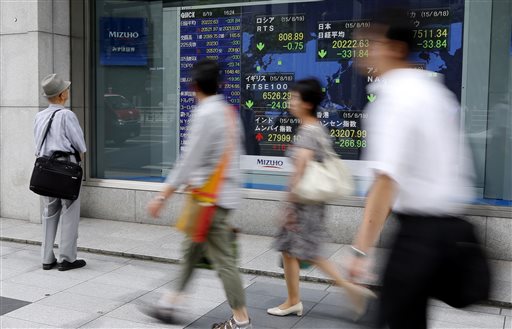
A man looks at an electronic stock indicator of a securities firm in Tokyo on Wednesday, Aug. 19, 2015. Asian shares slumped on Thursday, Aug. 20, led lower by Shanghai as concerns about the health of China’s economy battered confidence and after unexpectedly bearish minutes from the US Federal Reserve. AP PHOTO/SHIZUO KAMBAYASHI
HONG KONG–Asian shares slumped on Thursday, led lower by Shanghai as concerns about the health of China’s economy battered confidence and after unexpectedly bearish minutes from the US Federal Reserve.
The dollar eased after the Fed dampened expectations for a rate rise in September and outlined its fears about the global economy, sending oil prices to fresh lows.
Tokyo closed down 0.94 percent, or 189.11 points, at 20,033.52, as the yen strengthened against the greenback, adding to worries about Japan’s slowing exports.
Sydney fell 1.70 percent, or 91.6 points, to 5,288.6, dragged down by banking and resources shares, while Seoul dipped 1.28 percent, or 24.83 points, to 1,914.55.
Shanghai lost 3.42 percent, or 129.82 points, to end at 3,664.29 while Hong Kong dipped 1.77 percent, or 410.38 points, to end the day at a fresh eight-month low of 22,757.47.
Dealers said markets remained clouded by uncertainties over China’s economy after the shock devaluation of the yuan last week added to fears it is slowing more than thought.
“The Fed appears to be heading toward a rate hike and this, against the backdrop of deflationary forces globally, is creating intense uncertainty,” Shane Oliver, head of investment at AMP Capital, told Bloomberg News.
“Investors have now grown used to near zero interest rates for more than six years in the US and there is naturally a fear that raising them will threaten the still fragile US and global economies.”
The dollar lost more than 1 cent against the euro on Wednesday after minutes from the Fed’s most recent meeting said that while conditions for a rate increase were “approaching” they had not yet arrived.
In Tokyo, the dollar dipped slightly to 123.87 yen, from 123.89 yen in New York, but was sharply down from 124.32 yen in Asian trading on Wednesday.
The euro rose to $1.1154 and 138.02 yen from $1.1121 and 137.78 yen after news Greece had repaid 3.4 billion euros ($3.79 billion) due to the European Central Bank.
Oil slides
Minutes from the Fed, which met before China’s surprise devaluation of the yuan last week, also highlighted concerns about the global economy and particularly China that have weighed on shares and commodities.
The Fed warned “a material slowdown in Chinese economic activity could pose risks to the US economic outlook.”
Fears about Asia’s largest economy, which is the world’s top energy importer, and data showing a rise in US petroleum inventories pushed oil to a fresh six-and-a-half year low in New York.
Oil stocks rose 2.6 million barrels in the week ending August 14, according to the US Department of Energy.
In Asia, crude extended losses to trade a hair’s breadth away from the psychologically important $40 a barrel mark–a level not seen since the height of the financial crisis in 2009.
US benchmark West Texas Intermediate (WTI) dipped 41 cents to $40.39 in afternoon trade, after falling sharply in New York to its lowest level since March 2009.
Brent crude dropped 28 cents to $46.57 a barrel.
The drop weighed on energy companies in Asia, with Petrochina among one of the major losers in Shanghai, dropping 3.95 percent, while CNOOC lost 2.02 percent.
US banking giant Citigroup said WTI could fall to $32 a barrel, levels not seen since the throes of the financial crisis, pressured by excess supplies.
“Oil balances point to further oversupply throughout 2015 begging the question how low can oil go,” it said, adding that hitting the multi-year low of $32.40 a barrel, last seen in 2008, “is a conceivable reality.”
Safe haven gold got a boost, trading at $1,138.80 compared to $1,122.65 late Wednesday.
Shares in Qantas fell 5.85 percent to Aus$3.54 after Australian flag carrier’s Aus$557 million ($409 million) annual net profit missed market expectations.
Kirin shares closed up 0.39 percent at 1,818.50 yen after news it had paid $560 million for a controlling stake in Myanmar’s biggest brewer.
In other markets:
— Malaysia’s main index fell 0.32 percent, or 5.03 points, to close on 1,577.41.
Telekom Malaysia lost 0.95 percent to 6.23 ringgit, RHB Capital dropped 1.68 percent to 6.42 ringgit while Malayan Banking gained 1.65 percent to 8.60 ringgit.
— Bangkok dropped 0.48 percent, or 6.59 points, to 1,372.53.
Airports of Thailand rose 2.29 percent to 268 baht, while oil company PTT fell 5.49 percent to 258 baht.
— Jakarta ended down 0.94 percent, or 42.33 points, at 4,441.91.
Mining equipment provider United Tractors gained 1.61 percent to 18,900 rupiah, while animal feed manufacturer Charoen Pokphand Indonesia fell 5.48 percent to 1,810 rupiah.
— Singapore closed down 1.03 percent, or 31.47 points, at 3,009.78.
DBS Bank fell 1.23 percent to close at Sg$18.48 and oil rig maker Keppel Corp. settled at Sg$6.96, down 1.83 percent.
— Mumbai fell 1.16 percent, or 323.82 points, to 27,607.82.
Pharmaceutical company Lupin soared 5.39 percent to 1892.10 rupees but natural resources firm Vedanta dropped 4 percent to 98.50 rupees.
— Wellington fell 0.15 percent, or 8.83 points, to 5,742.45.
Fletcher Building was 1.80 percent off at NZ$7.65 and Spark New Zealand was down 0.90 percent at NZ$2.76.
— Taipei edged up 0.10 percent, or 7.97 points, to 8,029.81.
Taiwan Semiconductor Manufacturing Co. was 0.80 percent higher at Tw$126.0 while Hon Hai Precision was down 0.79 percent to Tw$87.4.
— Manila fell 0.90 percent, or 66.75 points, to 7,278.98.
Top-traded Ayala Land Inc. lost 1.85 percent to 37.10 pesos while GT Capital Holdings Inc. plunged 2.02 percent to 1,264 pesos.